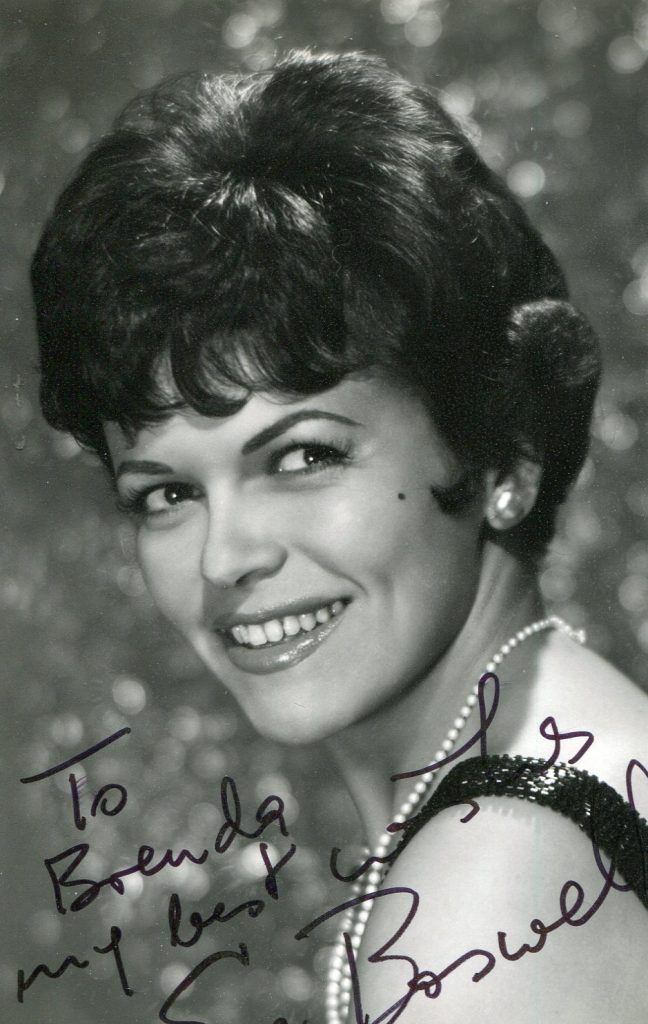
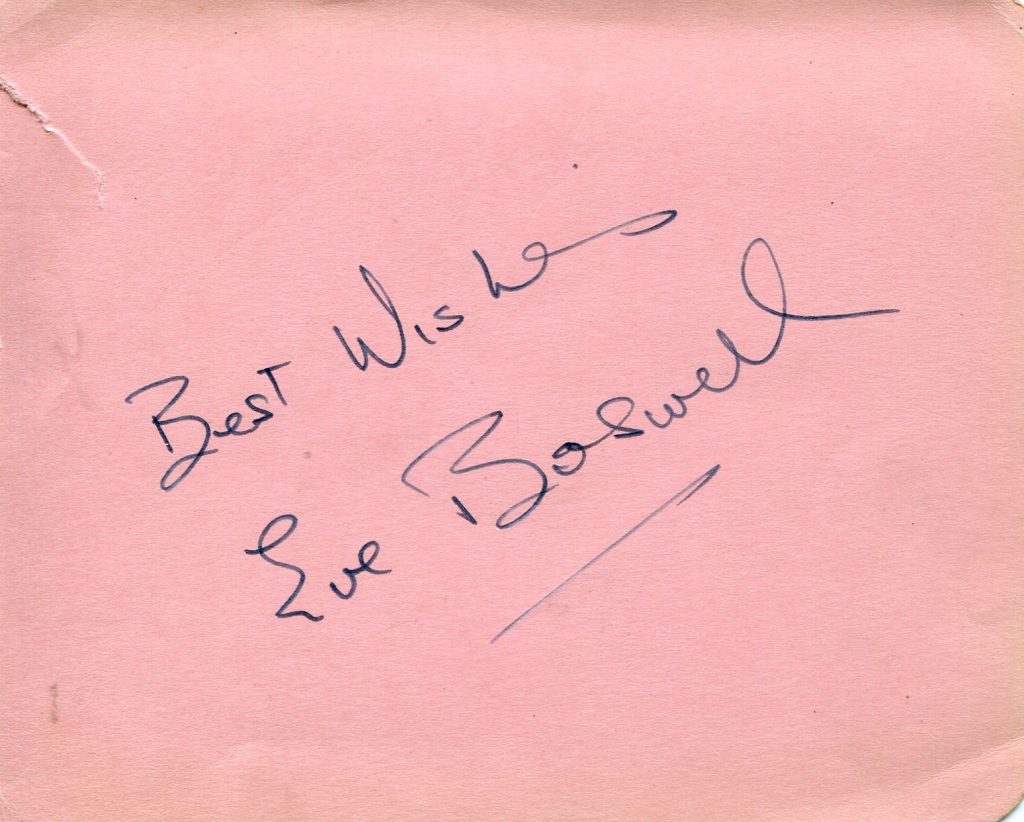
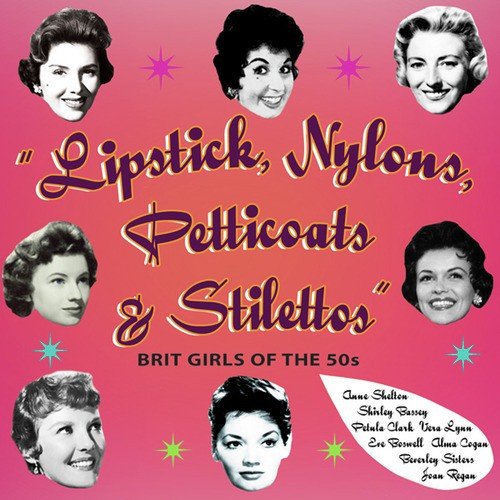
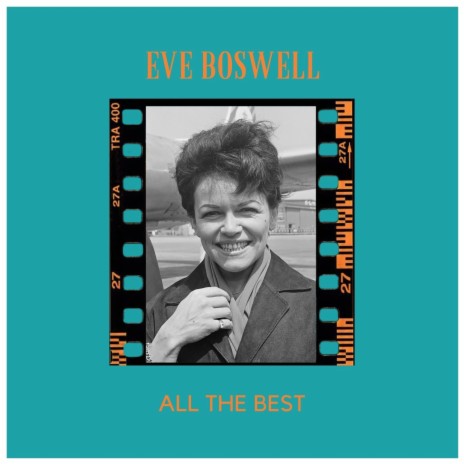
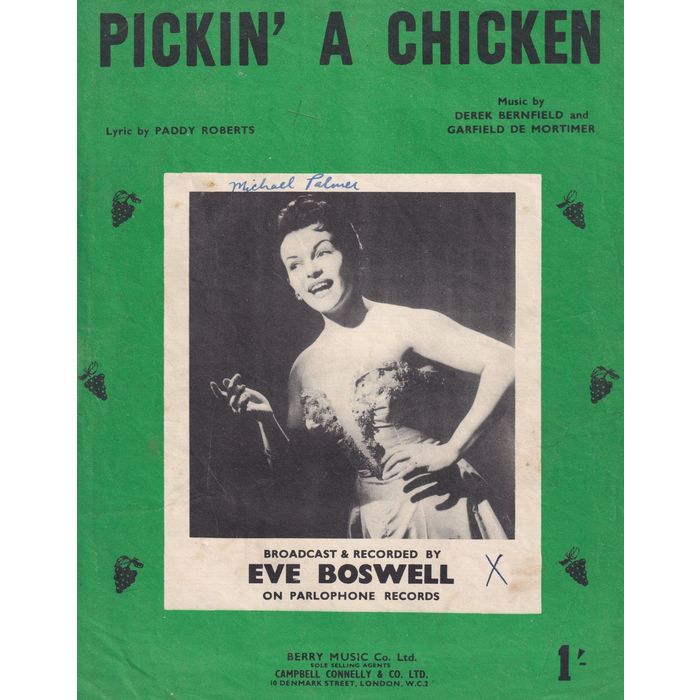

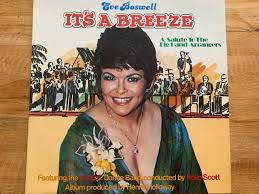
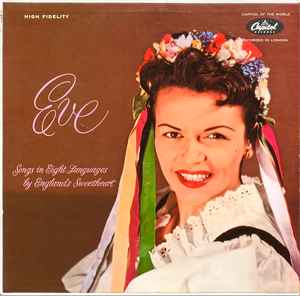
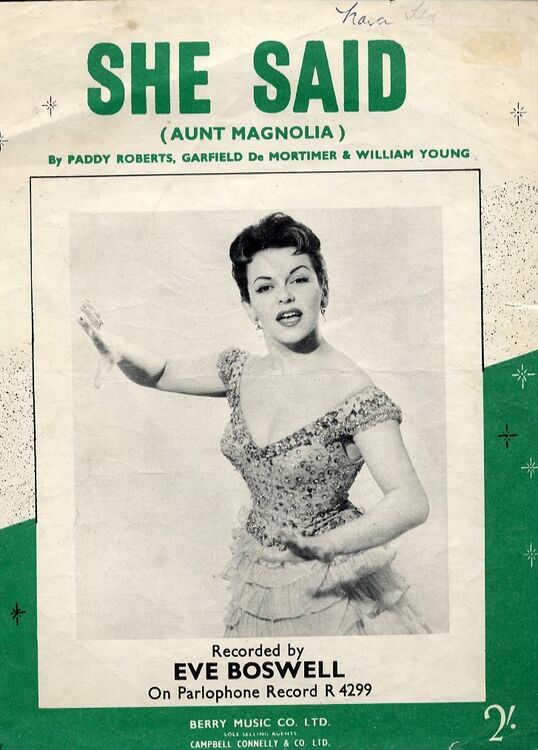
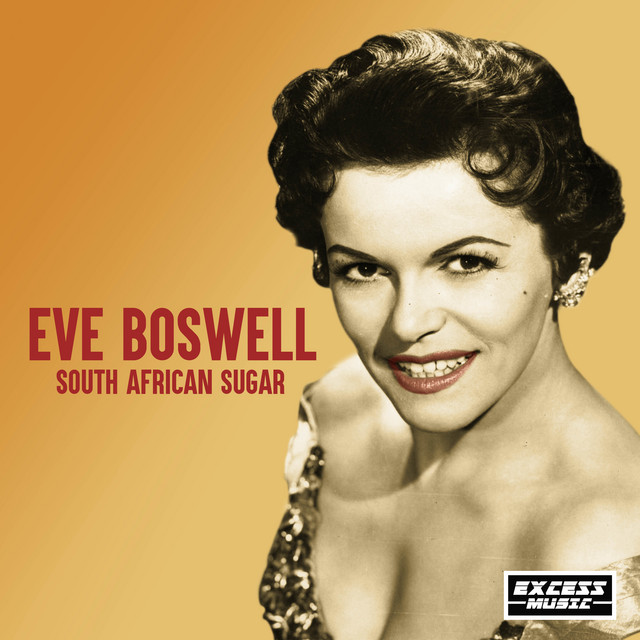
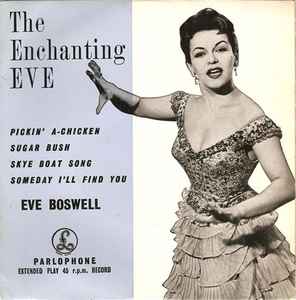
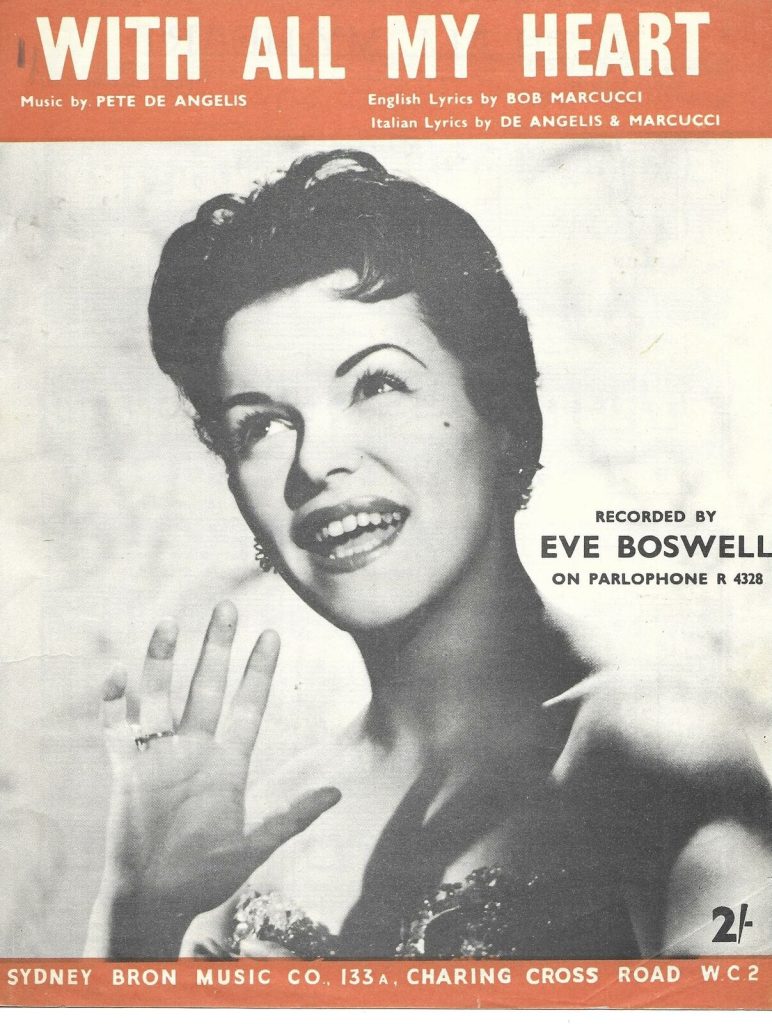


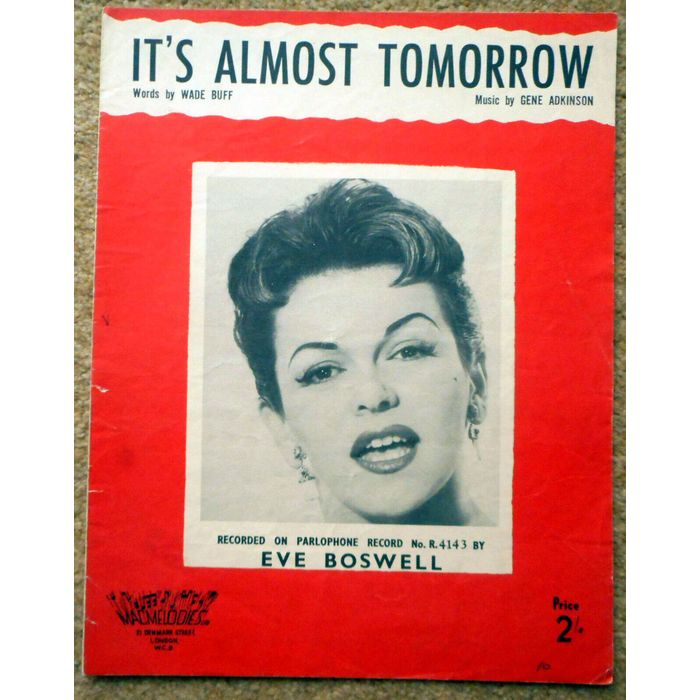
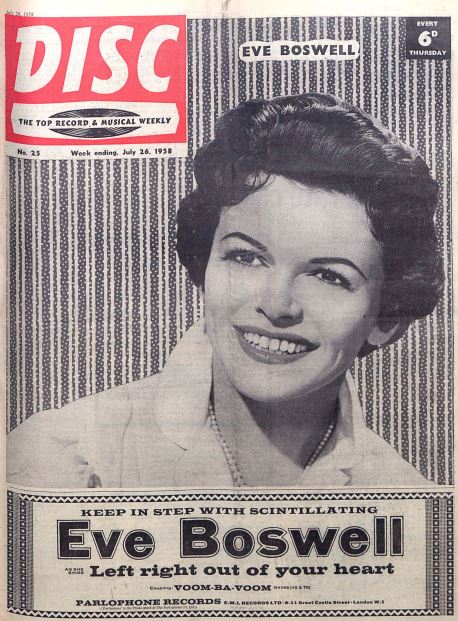
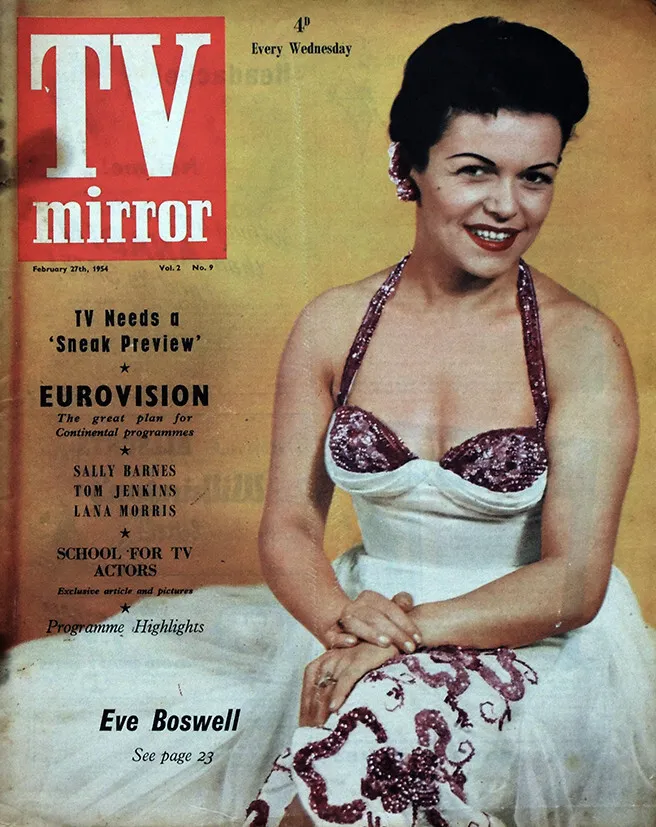
Denis Gifford’s “Independent” obituary:
Eve Boswell was born Eva Keleti, in Budapest, in 1924, the only daughter of a professional pair who toured the world with their musical act. Educated in Lausanne, Switzerland, she studied classical piano at the famous Lausanne Academy before joining her parents as a teenager. The act changed its name to the Three Hugos and as such made its debut in a Paris night-club. Young Eva, supposed to play the piano and join in some harmony singing, was so scared she ran off the stage.
When the Second World War was declared in September 1939 the act was on tour in England. Unhappily the family was classified as alien, so, taking a job with the Boswell Circus, they promptly departed for a tour of South Africa. Here Trevor McIntosh, the son of the owner, taught Eve to speak English, and the two fell in love. In time they married.
It was Trevor who encouraged the girl to sing and to change her name to Eve Boswell, after the circus. Soon she could be heard over South African radio singing with Roy Martin and his dance band from the Coconut Grove in Johannesburg. Adrian Foley (Lord Foley), a pianist and composer working in South Africa after the war, liked her voice. Alan Dell, the disc-jockey who was a local radio producer at that time, made some private recordings of her and Foley took them to London to play to prospective publishers.
Geraldo (Gerald Bright), then the top dance band leader, heard them, liked them and sent the girl a telegram offering her three months work. Eve, Trevor and their small son Michael promptly sold up their African homestead and sailed for England. She opened with Geraldo at the Blackpool Winter Gardens on 1 June 1949. At the end of her first week Geraldo cancelled her contract and gave her a new one for a whole year. In the end she stayed with him for more than two years.
Geraldo’s band was a broadcasting favourite (“Hello again – we’re on the radio again!”) and his new singer was heard over many a BBC programme. Two months after her debut date she cut her first record, “Again”, but as was traditional at the time she was billed, not by name, but as “Vocal Refrain”. She suffered this indignity through several recordings, including a romantic version of the comedian Reg Dixon’s signature tune, “Confidentially”, before getting her proper billing in April 1950 with “I Can Dream Can’t I”. (All her records from 1949 to 1959 were on the Parlophone label.)
In July 1950, while Geraldo and his band were playing for holidaymakers aboard the Queen Mary, Boswell returned to South Africa for a working holiday, and also supplied the singing voice for the Hollywood star Vera- Ellen in her British film Happy Go Lovely (1950). Vera-Ellen was a wonderful dancer but hopeless as a singer. This would turn out to be Boswell’s only brush with the cinema, a tragedy considering her prettiness and her talent.
Boswell parted with Geraldo in January 1952 and with her husband as her manager launched herself on a solo career. Her first big success was supporting the comedian Derek Roy in a variety tour of his radio series, Happy Go Lucky. Roy had also begun as a vocalist for Geraldo, and the two recorded a well-sung duet called “Dance Me Loose”. A cover version of an Arthur Godfrey disc, it failed to make the hit parade.
Many radio appearances during this time included The Forces Show, a 60- minute spectacular starring Richard Murdoch and Kenneth Horne – the Much Binding in the Marsh pair – as hosts; Workers’ Playtime, the midday series for factory hands; Henry Hall’s Guest Night; and finally in 1954 her own series, Time To Dream. This was compered by Alan Dell, who had by now come to England to further his own radio career. She also crossed the Channel via recordings to star in a Radio Luxembourg series called Family Album. This featured Philip Green and his Orchestra and was sponsored by Marshall Ward, the catalogue company.
Her first true hit came in August 1952, “Sugar Bush”, with its chorus of “Oh we’re never not gonna go home, we won’t go” and the extra gimmick of the closing chorus being sung in Afrikaans. She was so thrilled with its success that she named her pet poodle Bush, and added her first caption to her variety billing: “Eve Boswell the Bush Girl”. More than a year later, still billed the same way, she appeared in the Royal Variety Performance at the London Coliseum.
She was back double-billed with Derek Roy and supported by the newcomer Tommy Cooper (“TV’s Mad Magician”), in a Southport summer season show, Happy and Glorious (1954), but the continuous work proved too much. Just as an edition of The Forces Show was about to go on the air (Sunday 3 October) she collapsed and a doctor in the house diagnosed nervous exhaustion. Two weeks later she was back on tour and that Christmas made her pantomime debut in Humpty Dumpty at Dudley. Once again Derek Roy and Tommy Cooper were her co-stars.
More variety followed, both in South Africa and England, plus a number of shows for television. These included Hit Parade, Commonwealth Cavalcade, and Off the Record, in which the former bandleader Jack Payne tried to adapt his radio disc-jockey format for television. Her song hits continued with the Afrikaans “Skokiaan” for which she invented a “New Sound”, a combination of low-blown clarinet and vibraphone; and in October 1955 her one and only major hit. This was “Pickin’ a Chicken”, a South African tune with new words composed by Paddy Roberts. Intended as the “B”, to the long-forgotten “Blue Star”, this lively number shot to No 9 on the British hit parade.
In June 1956 she visited America to promote her new release deal with Capitol Records, appearing on radio and television. Returning to open The Big Show at Blackpool Opera House, she co-starred with the American comedians George and Bert Bernard, who mimed to gramophone records dressed up as the Andrews Sisters. She made her entrance in a well-staged circus scene, bursting through a paper hoop and juggling, a hitherto unknown talent that surprised the audience. In fact they didn’t know who she was until she started to sing.
Unhappily another breakdown followed, then the work continued non-stop; pantomimes, summer shows, records, and her first LP, on which she sang 10 songs in nine different languages. It was called Sugar and Spice (1956). One major touring show was Harold Fielding’s Music for the Millions (1957); she appeared with the classical pianists Rawicz and Landauer, the television comic Arthur Haynes, and pop stars Micki and Griff. There were also Sunday concerts including one at the Blackpool Opera House with Johnnie Ray the crying crooner. Nineteen fifty-eight saw her based at Blackpool for a 22-week run of You’ll Be Lucky, supporting the top radio comedian Al Read; the title was his catchphrase. An even longer season, 24 weeks, followed in 1959, this time in Glasgow. She backed the Scots comic Jimmy Logan in Five Past Eight.
Always a globe-trotter, Boswell became the first “English” singer to have her own show on Hungarian television (1960), returning to Scotland for another long run with Jimmy Logan. Yet another new talent amazed her audiences; she and Logan played a duet on the bagpipes.
But with the rock ‘n’ roll revolution of the Sixties Boswell’s multi- talents lacked the simplistic basic beat which it seemed all the teenagers wanted, and gradually, sadly, she faded from public view.
One of her last shows was a guest spot on Granada’s Wheel-tappers & Shunters Social Club in the Seventies, where she soon had an overjoyed audience clapping along with a selection of her past hits. Of course, “Sugar Bush” made a clapping climax. Remarkably and by sheerest chance, the Granada Plus channel re-ran this very programme only a week or so ago; an ideal if slightly premature tribute.
Denis Gifford
Eva Keleti (Eve Boswell), singer: born Budapest 11 May 1924; married three times, first to Trevor McIntosh (one son); died Durban, South Africa 13 August 1998
Eve Boswell


